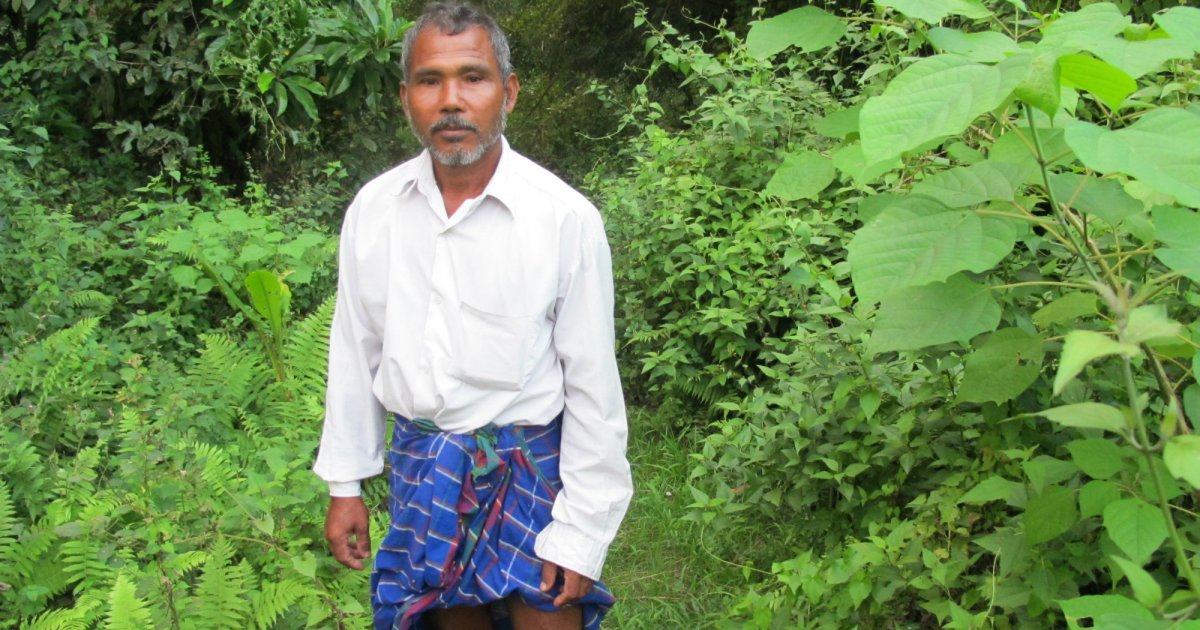Eka Brikhya Dasa Putra Samam is an idea worth ruminating and it is internalized and executed into action in the best possible way by none other than the Forest Man of India, Jadav Payeng by creating a whole forest in a barren stretch of land on the bank of the mighty Brahmaputra. Hailing from one of the indigenous communities of Assam, the Missing and living in Kokilamukh, 12 km away from Jorhat,
Padma Shree Payeng is a man so grounded in his thought and attentive in his work who has a strong message to share with each of the living human beings on earth through his endeavour so that the earth is preserved and sustained through our actions; not destroyed and devastated. He explains in his inherent mild but bold narrative style the reasons for his taking up the venture of creating a forest which is now known as the Molai forest, named after his nickname Molai and the necessity of tree plantation for the life of human beings on earth.
He was fourteen or fifteen years of age when he first visited the barren land where the forest now stands. It was 1979 when a huge flood heated Assam and dumps of waste due to the quick drying up of the flood were left in the sandbars of the mighty Brahmaputra. Due to the prolonged drought that year in the month of Jeth (May-June) as he describes it as Teish Khor (Khor is the Assamese word meaning draught), those areas post-flood suffered from high dryness and heat that caused the death of many several snakes in the sandbars.
He was deeply grieved to see that and thought that if nothing is done, he would also die the same way one day as he could see the violent behaviour of nature in the form of flood and its aftermath. The Molai forest was created out of the deep pain he suffered at the sight of the pathetic death of the snakes. He went to one of the nearby Deuri villages located five kilometers away from the land and enquired about any possible means to stop the death of the snakes in the sandbars after the flood. The elders there advised him to plant the tallest grass in the world. He firstly couldn’t make out what they had indicated but, was later explained that these are the bamboo trees which can be planted at the place of the death of the snakes. Once grown up, the snakes will get shelters there and the men will get oxygen and shade to take rest. He was provided with 50 bamboo roots by those villagers, which he planted along with other plants.
Once those started growing up, more samplings could be collected. Even from the other trees, when they produced seeds, hundreds of samplings grew independently by falling on the ground. Payeng used to carry water from the nearby river to water the plants and samplings as the land lacked humidity then. After thirty years of the constant care and effort of this strongly determined man, that once barren piece of land turned out to be a dense forest.
Due to forestation, deer, leopards, rhinos, elephants, and hundreds of bird species (almost 80% of the total bird species in the world) came to this area making it a hotspot of biodiversity. Payeng is unhappy with the education system in India which is based more on theory and less on practical knowledge. He explains his observation that even many professors of Botany today seem to know the theoretical names of plants, but they are unable to identify the trees in the real world. Covid19 has shown us how equal we all are as the highest intellectual animal on earth despite having the labels of being rich or poor from a financial point of view.
It has taught us many lessons to relook at life and the environment where we live in. We remember those clear and serene natural pictures getting circulated on the internet of the Ganga River, of some mountains and especially the air of the capital of the country, Delhi which is vague and much polluted, but appeared to be clean and soothing during the lockdown. Mister Molai or Payeng believes that if a lockdown of only seven days is declared every year in the whole world, the balance of the environment throughout the world will get restored. It is not only the responsibility of the USA or India to protect the environment but, we must create a shared space to execute such plans; only then the earth will see a longer life.
Nature is all-knowing and self-fulfilling. It never drops or skips its functions; thereby regenerating liveliness constantly in its elements. He says by referring to his Molai forest that in nature, the animals, the birds, the rivers and all the other elements are capable of sustaining greenery; only human beings are the ones who destroy it. Assam is a unique and rare example of a hotspot of biodiversity where animals, birds, and other natural elements cohabit with human beings. Scholars and environment activists from different corners of the world had commented when visiting Assam for a conference on environment protection, that there is no space in Assam even to urinate because it is all covered with medicinal plants and trees as he exclaims.
Wild animals and birds will survive only in such an ecological hotspot that is unique in its existence and our incapacity to protect such a diverse ecology is a fault and a matter of shame for us. The Molai kathoni or forest is evident of his strong belief in the regenerative force of the earth and the life-giving power of the environment which has encouraged him again to engage in the creation of a new forest nearby the existing one in a landmass of 2000 hectares. He has been gifted a good number of tree samplings by the government of Assam to be planted on this new piece of land which has already been started right from 2011.
He expects this to be prepared within fifteen years only as the Molai forest has produced many trees, and samplings and even created a sustainable humid landmass around it. He hopes to finish this project as soon as possible because it will appear crucial in safeguarding the existence of the whole river island of Majuli. Payeng is thus, an example of how determined and truthful one should be to follow a path not travelled by many people. He has himself become an epitome of a guardian of the environment through his constant effort to safeguard it.
It is said that great people don’t do great things, but they do simple things greatly and Jadav Payeng is so far the best example from Assam of how great a man can become through his simple action and grand purpose. He never anticipates any award or recognition from anyone for his action but expresses his wish to promote the message of his endeavour on a larger scale so that mother earth is saved for the future generation to come.
Author: Himakshi Kashyap, Assistant Professor, English, Nowgong College, Assam, India



